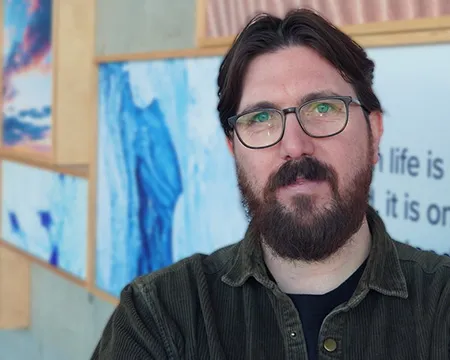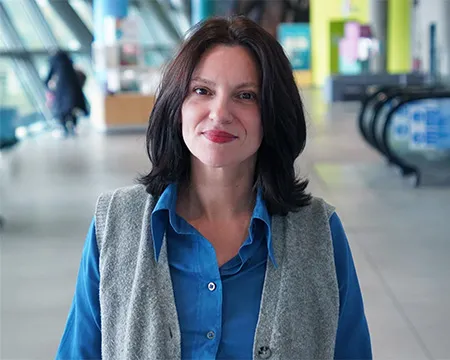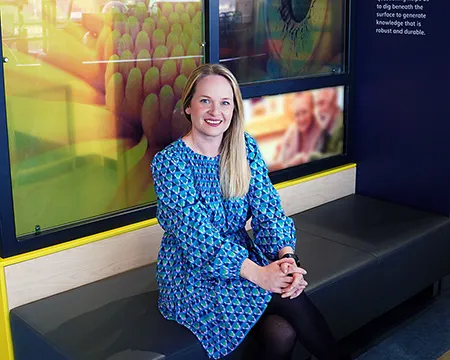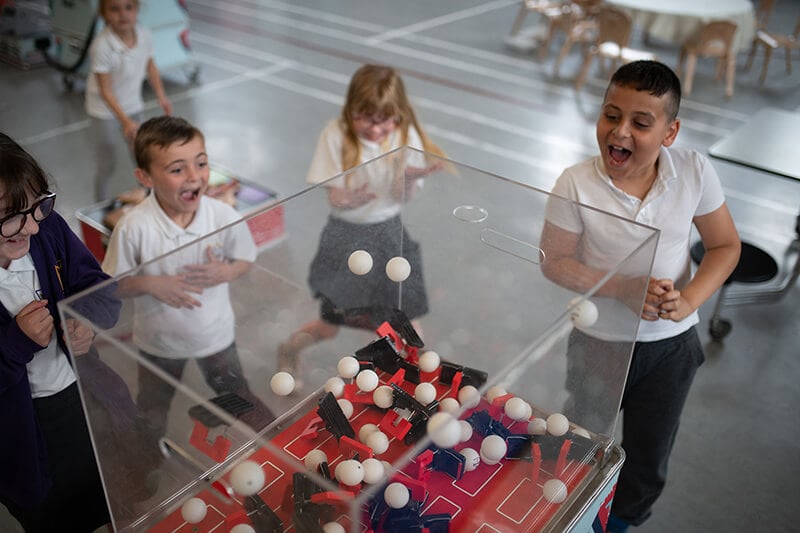Breathe Easy

In the run-up to Clean Air Day on 15th June, Claire Gemson finds out how the quality of the air you breathe plays an unexpected role in your mental health. Glasgow Science Centre is working closely with SEPA (Scottish Environment Protection Agency) to make sure the city’s children know the facts about air pollution.
Take a deep breath. Researchers are starting to understand that air pollution impacts more than just our physical health. A clear picture is emerging of just how much poor air quality affects our brains. A recent study* shows that those who live in areas with higher levels of air pollution are more likely to suffer from depression and anxiety. It is timely that the key message for this year’s Clean Air Day is: “Clean up our air to look after your mind”. It is a message which the team at Glasgow Science Centre and partners at SEPA have been busy promoting with children throughout the city.
Educating the Next Generation
Dr Colin Gillespie, SEPA’s Air Modelling Unit Manager, has just returned from a morning speaking to P7 pupils about air pollution. Gillespie is clear that educating the next generation about the importance of air pollution is essential: “Through our work we can show the children things such as how even resurfacing a road outside can affect air quality. They could also clearly see the effect on air quality when everyone was driving away at the end of the day at the same time.”
Dr Gillespie continues: “Using real examples from their own area really brings the issue home to the children. These pupils live in a village and might have assumed that air quality wasn’t something they had to worry about. If you capture the minds of the young people then the message drips down into the rest of the family.”
It's a point that SEPA’s Principal Policy Officer for Air Quality, Graham Applegate, reinforces: “Air pollution can affect our health even at low levels, as we go about our day-to-day lives.” In other words, little daily exposure to things like traffic must be taken seriously by everyone, young and old.
Graham adds it is about “reinforcing the positive aspects. There are multiple benefits to encouraging more active travel and the use of green spaces. It is about giving people evidence to work out small changes for themselves.”
Empowering Children and Creating Biodiverse Spaces
Equipping pupils with evidence to come up with their own ideas to tackle air pollution has been key in the range of activities developed by Glasgow Science Centre in tandem with SEPA. Children become air investigators, creating their own air pollution monitors with paper plates and petroleum jelly. Pupils have also been taking part in Air Pollution Ping Pong, which aims to show just how crucial our noses are in defending our bodies against air pollution with ‘bogey paddles’ showing how bogeys save the day. In Greater Glasgow alone, 3,000 primary schoolchildren have taken part.
Besides working with schools, Glasgow Science Centre has created an accessible place for the public to visit where they can be closer to nature- carving out a green space in the heart of the dear green place. The centre’s familiar stainless steel curves are now fringed with fresh life thanks to a drive to create biodiverse gardens in the outside area. What was once a grey, paved expanse now features floating wetlands and grasslands which visitors can enjoy for free. The warm weather has brought an explosion of greenery, colourful blooming wildflowers, lush grasses and some surprising new neighbours...
“They are like wee dinosaurs.” laughs Abi Jeorrett, Science Learning Co-ordinator at Glasgow Science Centre. Abi is telling the story of some new arrivals - moorhen chicks who have taken up residence in the centre’s moat. The arrival of the moorhen family is no accident. Glasgow Science Centre has carefully cultivated its garden habitats, hoping to bring more biodiversity to Govan. When the floating wetlands were launched earlier in the Spring, the centre was aiming to attract a range of different creatures. It has done just that. A pair of swans has also chosen one of the floating wetlands to nest and await their cygnets.
As Abi puts it: “Generally, things you can do to help air quality will also help with your mental health. It’s nice to see people walking outside and pausing for a rest on the benches and a chat. Spend time in nature, exercise in the fresh air and make small, sustainable travel changes. It all adds up to help you breathe easier.”
Further Information
This blog post by Claire Gemson is adapted from an article by Glasgow Science Centre that first appeared in Glasgow Times in June 2023. More information on Clean Air Day can be found on their website
TIPS FIVE TIPS TO TRY FOR CLEAN AIR DAY 2023
*Avoid busy streets – sounds simple but by taking a quieter route, you can avoid exposure to air pollution
*Add interest to your day by varying your route. Check out where there are green spaces and weave these into your daily plan
*Engage in your local community. For example, tree planting initiatives, helping out in a local school garden. Your local Facebook group can be a great resource for information
*Positive travel. This can be a fun activity as a family during the holidays. Plan a travel route for a day trip and compete to make it as “air quality friendly” as possible. Are there quieter times and routes you can pick? Can you walk and cycle? Or take public transport?
*If you must drive, aim to leave the car behind one day a week





